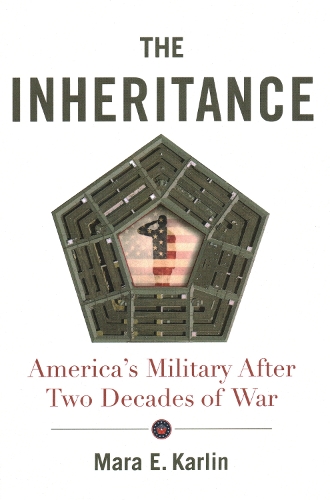
The Inheritance: America's Military After Two Decades of War
(Paperback)
Publishing Details
The Inheritance: America's Military After Two Decades of War
By (Author) Mara E. Karlin
Bloomsbury Publishing PLC
Brookings Institution
14th December 2021
United States
Classifications
Professional and Scholarly
Non Fiction
Public administration / Public policy
Political structure and processes
International relations
355.009730905
Physical Properties
Paperback
320
Width 154mm, Height 223mm, Spine 22mm
454g
Description
Exploring how the U.S. military can move beyond Iraq and Afghanistan
Since the September 11, 2001, attacks, the U.S. military has been fighting incessantly in conflicts around the globe, often with inconclusive results. The legacies of these conflicts have serious implications for how the United States will wage war in the future. Yet there is a stunning lack of introspection about these conflicts.
Never in modern U.S. history has the military been at war for so long. And never in U.S. history have such long wars demanded so much of so few. The legacy of wars without end include a military that feels the painful effects of war but often feels alone. The public is less connected to the military now than at any point in modern U.S. history. The national security apparatus seeks to pivot away from these engagements and to move on to the next threatsnotably those emanating from China and Russia. Many young Americans question whether it even makes sense to invest in the military. At best, there are ad hoc, unstructured debates about Iraq or Afghanistan. Simply put, there has been no serious, organized stock-taking by the public, politicians, opinion leaders, or the military itself of this inheritance.
Despite being at war for the longest continuous period in its history, the military is woefully unprepared for future wars. But the United States cannot simply hit the reset button. This book explores this inheritance by examining how nearly two decades of war have influenced civil-military relations, how the military goes to war, how the military wages war, who leads the military and who serves in it, how the military thinks about war, and above all, the enduring impact of these wars on those who waged them. If the U.S. military seeks to win in the future, it must acknowledge and reconcile with the inheritance of its long and inconclusive wars. This book seeks to help them do so.
Reviews
In between her stints of service in the Pentagon, first under U.S. President Barack Obama and now under President Joe Biden, Karlin explored what went wrong with the two big U.S. wars of this century, in Afghanistan and Iraq. She considered, in turn, how the military went to war, how it waged war, who served in the ranks, and who led, before addressing what the prosecution of these wars meant for future conflicts. To this end, she interviewed around 100 civilian and military figures. Quotes from these interviews enliven her book and help bring home the importance of personalities, leadership, the emotions that can be aroused by apparently dry debates about civil-military relations, and the dangers of too great a separation between the armed forces and the society they serve. Americans routinely express gratitude for soldiers without really understanding what their service entails or the toll of long tours in hostile environments. She urges continued reflection on mistakes as well as achievements, better dialogue between the civilian and military leadership, and holding them both to proper account. * Foreign Affairs *
Author Bio
Mara E. Karlin was director of Strategic Studies and associate professor at the Johns Hopkins School of Advanced International Studies and a nonresident senior fellow at the Brookings Institution. Karlin previously served in national security roles for five U.S. secretaries of defense. She is the author of Building Militaries in Fragile States: Challenges for the United States.
